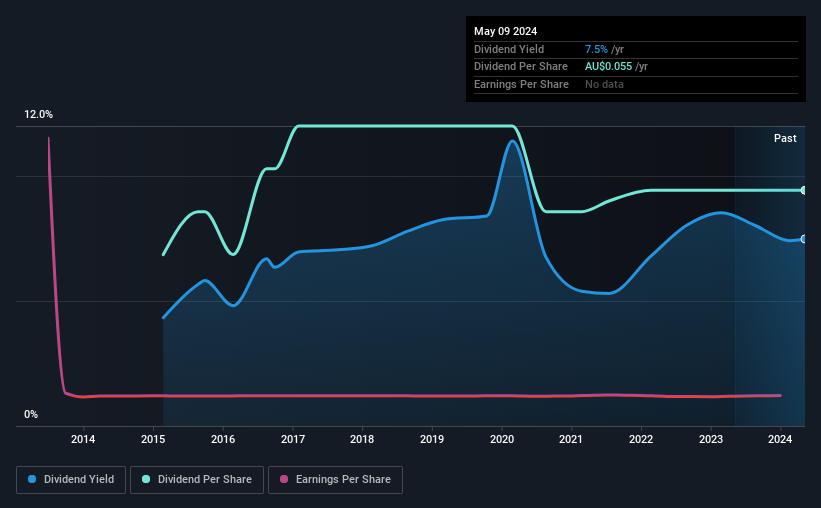- Australia
- /
- Capital Markets
- /
- ASX:SNC
Here's What We Like About Sandon Capital Investments' (ASX:SNC) Upcoming Dividend

It looks like Sandon Capital Investments Limited (ASX:SNC) is about to go ex-dividend in the next four days. The ex-dividend date is one business day before the record date, which is the cut-off date for shareholders to be present on the company's books to be eligible for a dividend payment. The ex-dividend date is of consequence because whenever a stock is bought or sold, the trade takes at least two business day to settle. Meaning, you will need to purchase Sandon Capital Investments' shares before the 15th of May to receive the dividend, which will be paid on the 3rd of June.
The company's upcoming dividend is AU$0.0275 a share, following on from the last 12 months, when the company distributed a total of AU$0.055 per share to shareholders. Looking at the last 12 months of distributions, Sandon Capital Investments has a trailing yield of approximately 7.5% on its current stock price of AU$0.735. Dividends are a major contributor to investment returns for long term holders, but only if the dividend continues to be paid. So we need to investigate whether Sandon Capital Investments can afford its dividend, and if the dividend could grow.
Check out our latest analysis for Sandon Capital Investments
If a company pays out more in dividends than it earned, then the dividend might become unsustainable - hardly an ideal situation. Fortunately Sandon Capital Investments's payout ratio is modest, at just 43% of profit.
Generally speaking, the lower a company's payout ratios, the more resilient its dividend usually is.
Click here to see how much of its profit Sandon Capital Investments paid out over the last 12 months.

Have Earnings And Dividends Been Growing?
Stocks in companies that generate sustainable earnings growth often make the best dividend prospects, as it is easier to lift the dividend when earnings are rising. If business enters a downturn and the dividend is cut, the company could see its value fall precipitously. For this reason, we're glad to see Sandon Capital Investments's earnings per share have risen 12% per annum over the last five years.
Many investors will assess a company's dividend performance by evaluating how much the dividend payments have changed over time. In the past nine years, Sandon Capital Investments has increased its dividend at approximately 3.6% a year on average. It's good to see both earnings and the dividend have improved - although the former has been rising much quicker than the latter, possibly due to the company reinvesting more of its profits in growth.
To Sum It Up
From a dividend perspective, should investors buy or avoid Sandon Capital Investments? Companies like Sandon Capital Investments that are growing rapidly and paying out a low fraction of earnings, are usually reinvesting heavily in their business. This is one of the most attractive investment combinations under this analysis, as it can create substantial value for investors over the long run. We think this is a pretty attractive combination, and would be interested in investigating Sandon Capital Investments more closely.
So while Sandon Capital Investments looks good from a dividend perspective, it's always worthwhile being up to date with the risks involved in this stock. Case in point: We've spotted 3 warning signs for Sandon Capital Investments you should be aware of.
If you're in the market for strong dividend payers, we recommend checking our selection of top dividend stocks.
If you're looking to trade Sandon Capital Investments, open an account with the lowest-cost platform trusted by professionals, Interactive Brokers.
With clients in over 200 countries and territories, and access to 160 markets, IBKR lets you trade stocks, options, futures, forex, bonds and funds from a single integrated account.
Enjoy no hidden fees, no account minimums, and FX conversion rates as low as 0.03%, far better than what most brokers offer.
Sponsored ContentNew: Manage All Your Stock Portfolios in One Place
We've created the ultimate portfolio companion for stock investors, and it's free.
• Connect an unlimited number of Portfolios and see your total in one currency
• Be alerted to new Warning Signs or Risks via email or mobile
• Track the Fair Value of your stocks
Have feedback on this article? Concerned about the content? Get in touch with us directly. Alternatively, email editorial-team (at) simplywallst.com.
This article by Simply Wall St is general in nature. We provide commentary based on historical data and analyst forecasts only using an unbiased methodology and our articles are not intended to be financial advice. It does not constitute a recommendation to buy or sell any stock, and does not take account of your objectives, or your financial situation. We aim to bring you long-term focused analysis driven by fundamental data. Note that our analysis may not factor in the latest price-sensitive company announcements or qualitative material. Simply Wall St has no position in any stocks mentioned.
About ASX:SNC
Adequate balance sheet average dividend payer.
Market Insights
Community Narratives



